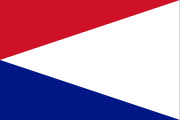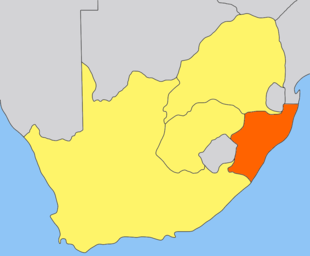Republic of Natalia
| Natalia Republiek | |||||
| Republic of Natalia | |||||
| 1839-1843 | |||||
|
|
|||||
| Official language | Dutch | ||||
| Capital | Pietermaritzburg | ||||
| Form of government | republic | ||||
| Head of state , also head of government | Prime Minister Andries Pretorius | ||||
| currency | South African pond | ||||
| independence | October 12, 1839 | ||||
The Republic of Natalia was a short-lived Boer republic founded by the Voortrekkers on November 11, 1839 after the Battle of the Blood River . It was on the coast of the Indian Ocean, north of the Eastern Cape . The republic was conquered and annexed by Great Britain in 1843 . After that, most of the Voortrekkers migrated north to what would later become known as the Orange Free State and Transvaal .
history
Prehistory to the Republic of Natalia
After the annexation of the Cape by Great Britain (1806) British law was introduced, which among other things also provided for the equality of whites and free non-whites, and from 1833 the abolition of slavery. English was also introduced as the only official language . The Boers who lived as farmers saw these legal innovations as a threat to their traditional way of life. In addition, the British colonial administration insisted on adherence to the borders agreed with neighboring Xhosa , which the Boers had repeatedly ignored. From 1835, an emigration movement began, the aim of which was to escape the sphere of influence of the British and British law. About 5000 people moved away. They settled in the area of the Zulu prince Dingaan and at Port Natal , a port south of what was then the Portuguese area.
The first Boer emigrants to enter the area were led by Pieter Retief and arrived in October 1837. He then tried to persuade the Zulu king to cede land to the Boer farmers. After the contract was signed, Retief and his group were murdered by the Zulu in January 1838, who then tried to kill the remaining Boers in Natal. Regardless of this, the other Boers did not return, but new emigrants followed.
The Battle of the Blood River
In December the Boers received reinforcements and moved against the Zulu under Andries Pretorius . On December 16, 1838, the Boers were attacked by an estimated over 10,000 Zulus. Since they had formed a wagon castle additionally protected by the area , they succeeded in defeating the Zulu after a fight of around three hours .
Boer state Natalia
The settlers declared themselves independent from England on November 11, 1839 by founding the Republic of Natalia. The colonial power did not accept that. The Boers were forcibly forced by the English to evacuate Natal in 1842.
Several fights broke out between the parties. After the Boers defeated the British at the Battle of Congella, the Boers briefly occupied Port Natal and besieged the British fort there, but were driven out by British reinforcements who arrived by sea. In 1843 the region was finally annexed by the British and became part of the Cape Colony.
literature
- George McCall Theal : The Republic of Natal. The Origin of the Present Pondo Tribe . University of Cape Town Library, Cape Town 1961.
Individual evidence
- ↑ Cf. Jörg Fisch: History of South Africa . dtv, Munich 1990, ISBN 3-423-04550-7 , pp. 128-132.
- ^ Keyword Kapland (history). In: Meyers Konversationslexikon . 4th edition. Publishing house of the Bibliographisches Institut, Leipzig / Vienna 1885–1892 ( online )
Coordinates: 30 ° S , 30 ° E


